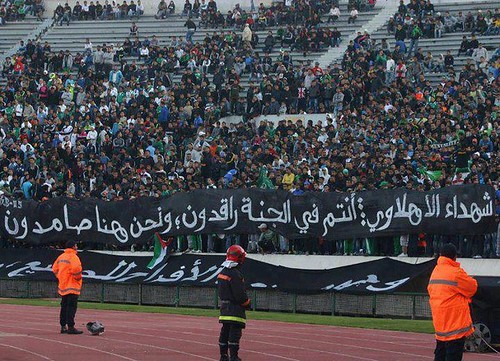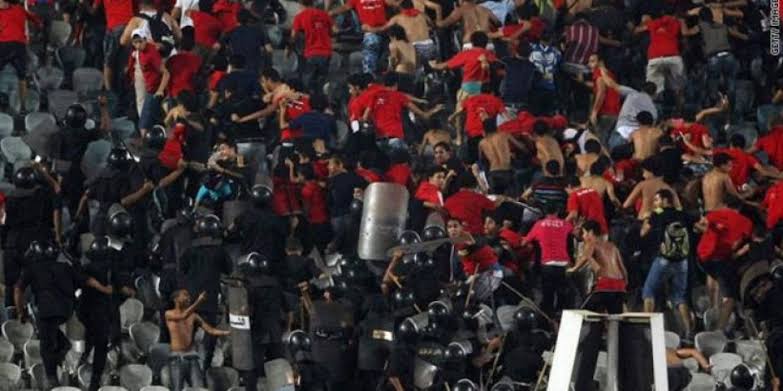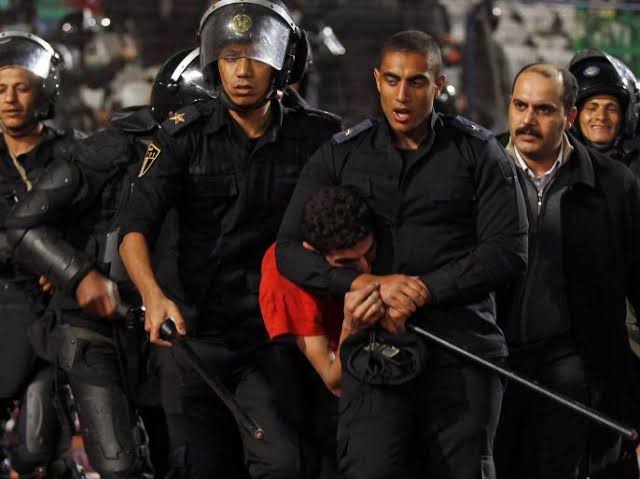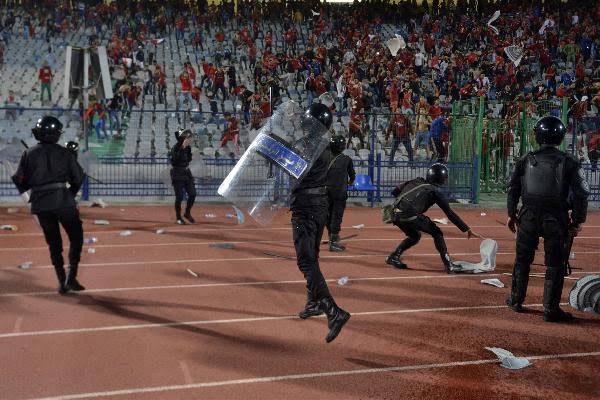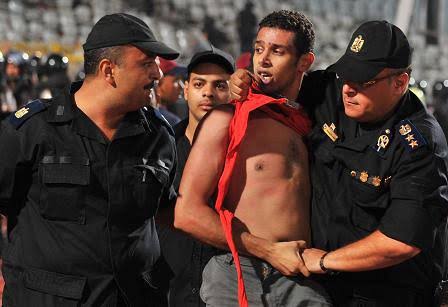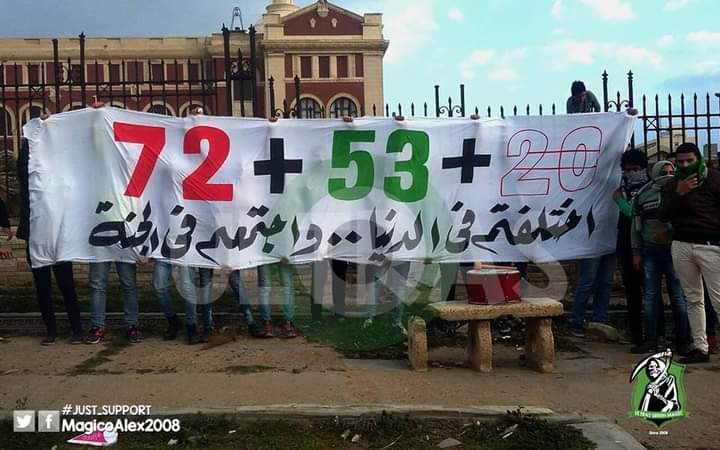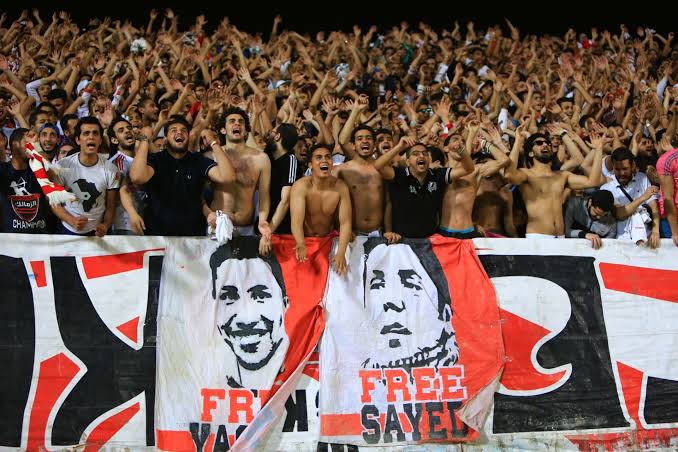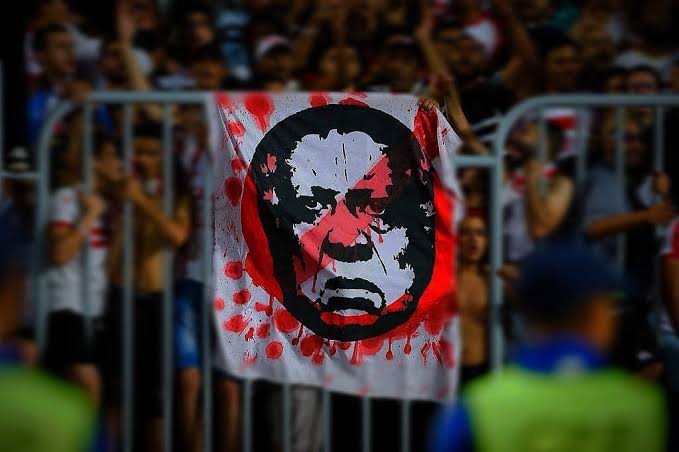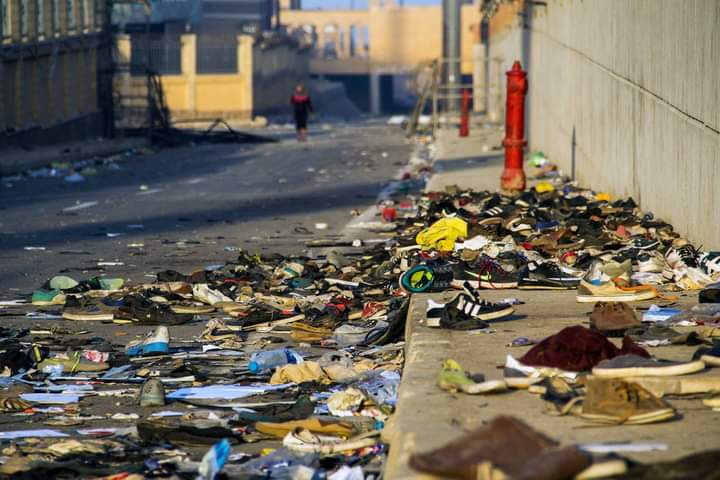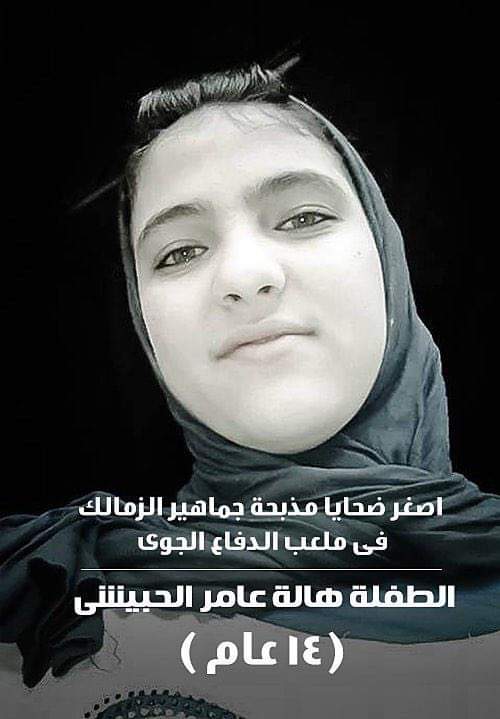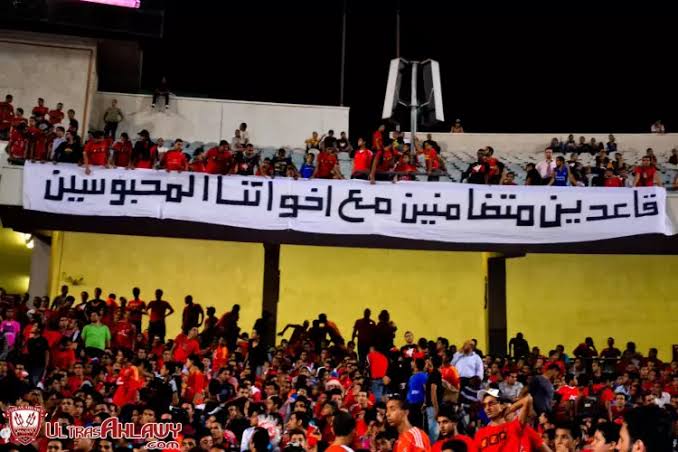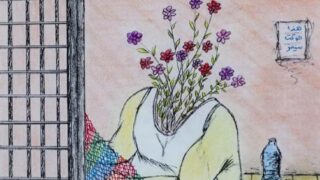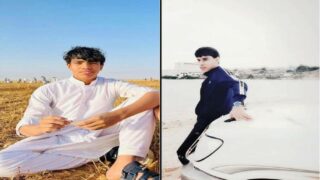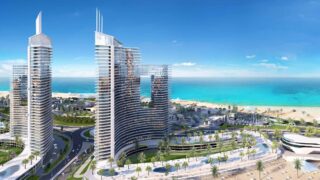
This publication has benefited from the support of the Rosa Luxemburg Foundation. This text may be reproduced in part or in full, provided the source is acknowledged.
A banner strung across the stands of the Cairo Stadium read, “Football is for the masses.” Before the kick-off of the 2014 CAF Confederation Cup final, Ultras Ahlawy, an organized group of football fans who support Al-Ahly Club, delivered a message to the authorities in multiple languages by hanging out a huge banner that read, “In all languages of the world, so that you may understand: football is for the masses.”
In 2007, Egyptian football Ultras (a name given to the hardcore fan base) emerged as groups capable of collective organization, garnering the attention of the government and society for their adoption of new traditions in football fandom. Before 2007, traditional forms of support prevailed in the stands until these rebellious movements introduced a novel culture that laid down the rule that loyalty to the club was defined by belonging to the entity.
Regarding the origins of ultras’ groups in Arab countries, the first to be established was the Ultras Dragon group in Libya in 1989 (1), in support of the Libyan Al-Ittihad Club. However, the group succumbed to the authority's crackdown less than two weeks after its emergence, resulting in its dissolution and the imprisonment of its members. In 1995, ultras made their appearance in Tunisia, where they formed the African Club Fan Association known as African Winners. Subsequently, similar groups emerged from underprivileged neighborhoods, and from then on, ultra groups swept other countries in the region.
Ultra’s debut in Cairo stadiums
Given the paramount importance of football to the passionate fans of the most popular game in the region, it was only natural that the ultras’ phenomenon would reach Egypt. Establishing ultras-style fan associations started with two groups: Ultras Ahlawy and Ultras White Knights, supporting Al-Ahly and Zamalek clubs respectively. These two clubs, known as the pillars of Egyptian football, hold a longstanding rivalry fueled by their fans. Al-Ahly undoubtedly surpasses Zamalek in the number of titles it has garnered and has a more extensive fan base. When it comes to a match between the two teams, there is absolutely no room for neutrality; one simply must pick a side: Ahly or Zamalek. This is the Cairo derby, capable of pitting members of the same family against each other, where a fierce loyalty prevails to either the Red (Al-Ahly fans) or the White (Zamalek fans).
Football in Egypt: Where People Find Solace
08-06-2023
The two ultras groups, initially composed of just a few members, quickly expanded and claimed the third-class stands as their zone. The first Egyptian ultras group, White Knights (UWK07), was officially established in March 2007 to support Zamalek, occupying the right side of the third-class zone. One month later, Ultras Ahlawy (UA07) was founded and chose to occupy the left side of the third-class zone.
Soon, similar fan associations were established for clubs with a fan base outside the capital, such as the Green Magic group that supports Al-Ittihad SC in Alexandria, the Green Eagles who supports Al-Masry SC in Port Said, and the Yellow Dragons who supports Ismaili SC in Ismailia.
Prior to the emergence of the ultras, there were other groups recognized by the clubs that tried to redefine forms of fandom, such as Al-Ahly Fans Club (AFC), preceded by Al-Ahly Lovers Union (ALU). The latter made the largest banner of the club’s logo and raised it in the Egyptian stands for the first time in 2001 during the Al-Ahly and Spanish Real Madrid match in Cairo. There was also Zamalek Lovers Union (ZLU) and the Ghazl El-Mahalla Club fans association.
Videos of various ultras’ entrance performances
Ultras White Knights’ entrance to the pitch in the centenary of Zamalek SC
Tifo by Ultras Ahlawy that reads “Football is for the masses”, in all languages of the world
From the Al-Ahly vs. Tunisian Sfax Club match 2014
From the Zamalek vs. African Club match
An entrance performance entitled “The Execution of the Field Marshal” from the Al-Ahly - Kenyan Tusker Club match
Due to the prevailing societal stereotypes, ultras’ members are exclusively male. And even though most of the individuals belonging to these groups come from slum areas, it is difficult to say that they have a particular class character, as the groups comprise members of diverse social backgrounds.
From the stands to Tahrir Square
“Football before us was but lies and deceit.” Thus begins the chant of Ultras Ahlawy, “Hekayetna” (“Our Story”), which emerged in the aftermath of the brutal Port Said massacre and the subsequent suspension of the Egyptian Premier League. The powerful lyrics narrate the conflict between the ultras and the regime, emphasizing the ultras’ rejection of the regime’s exploitation of football and its falsification of public awareness. The song also portrayed the relentless crackdown against the ultras, culminating in the authorities plotting revenge on these groups.
On February 1, 2012, Ultras Ahlawy were at the center of one of the deadliest disasters in football history. Immediately following a 3–1 loss to the Al-Masry club in Port Said, Al-Masry fans stormed the pitch and targeted Al-Ahly’s partition of the stands. 72 Al-Ahly fans were killed in the violent attack with knives, stones, and machetes, or died in the subsequent stampede to the stadium exits. During the riot, security forces did not lift a finger to stop the massacre. Instead, they closed the exit doors in the face of Al-Ahly fans, which worsened the stampede and lead to a greater victim toll.
The lyrical production of the ultras burgeoned after the massacre, sweeping not just the stands, but the squares of the Egyptian revolution as well, expressing anti-regime rage in the streets to the music of the trompeta (2).
Due to the prevailing societal stereotypes, ultras’ members are exclusively male. And even though most of the individuals belonging to these groups come from slum areas, it is difficult to say that they have a particular class character, as the groups contain members of diverse social backgrounds.
The influence of these songs and chants spread to other squares, far beyond the borders of Egypt, and were sung around the world.
Kill the revolution more and more
The word ‘free’ drives you crazy
No matter how brutal the warden may be
He’s a coward when facing my voice
These are some of the most well-known verses of the song "Our Story," which was repeatedly chanted by protesters in the squares of the October 2019 uprising in the Lebanese capital Beirut. This identification reflected the ability of the protest discourse in these songs to apply a dramatic impact elsewhere, as it traces a portrait of the poor social and political realities in the region and points a finger at the destructive counter-revolutionary forces that tried to stifle the voice of the people.
Amid the conflict, the authorities disallowed the ultras from attending matches. In 2017, the parliament passed Sports Law No. 71, which banned the establishment of sports fans' associations. Earlier, courts had handed down rulings classifying ultras’ associations as outlawed terrorist groups. In May 2015, the Court of Urgent Matters convicted fan groups of being terrorist organizations and banned their activities. The conflict ended after a series of crackdown campaigns and the arrest of individuals affiliated with these groups, some of whom have recently announced the dissolution of their groups and the suspension of their activities.
Egyptian security services have sought to exert control over the ultras since their inception. The police adopted an aggressive approach towards these groups, coupled with a violent attack from the media, which was a principal partner of the security services in the incitement against ultras groups.
In response, ultras, with their chants and slogans, transformed stadiums into spaces of protest and defiance of the Egyptian authority and the Ministry of Interior. The most prominent of the slogans was the notorious “ACAB” against the Ministry of Interior, an acronym for "All Cops Are Bastards". Meanwhile, police forces applied humiliating practices against football fans, such as ordering them to empty their pockets, confiscating their cheering props before the matches, and arbitrarily arresting members of the cheering squads.
Only three years separate the two bloodiest massacres in Egyptian football history. The Port Said Stadium massacre left 72 dead among the Ultras Ahlawy, while the Air Defense Stadium massacre left 20 dead among the Ultras White Knights. The ultras had long been a nightmare for the regime, and for that, the authorities sought to exterminate their movement.
The song “Hekayetna” ("Our Story") crossed borders, reaching the Lebanese capital, Beirut, where it was chanted by protesters in the squares of the October 2019 uprising. This identification reflected the ability of the protest discourse to have a dramatic impact elsewhere.
These violent practices began with the first appearance of Ultras Ahlawy in the stands, when its members objected to the security forces' refusal to hang their banner during a match between Al-Ahly and Enppi on April 13, 2007 (3). After skirmishes with security personnel, Ultras Ahlawy were able to raise the banner. However, the violent clashes began in 2010 when the police tried to prevent cheering props in a friendly match between Al-Ahly and Kafr El-Sheikh and arrested seven Al-Ahly fans.
“Fabricating cases is the habit of the Ministry of Interior,” says one of the Ultras Ahlawy chants. It is similar to the lyrics chanted by Ultras White Knights about security prosecutions: “You beat us, imprisoned us, and tried us on many trumped-up charges."
But long before the January 2011 uprising, solidarity with peoples' causes has always been part of the ultras’ culture. Ultras have always raised the Palestinian flag and advocated for the Palestinian cause with special slogans and chants. On January 22, 2011, Al-Ahly fans chanted in the name of Tunisia to celebrate the Tunisian revolution, raising the Tunisian flag at the Arab Contractors Stadium. The same thing was done in the indoor basketball court of Al-Ittihad Alexandria Club, where Al-Ittihad fans defied the security forces, loudly chanting the name of Tunisia during a match between Al-Ittihad and Al-Jazira Club.
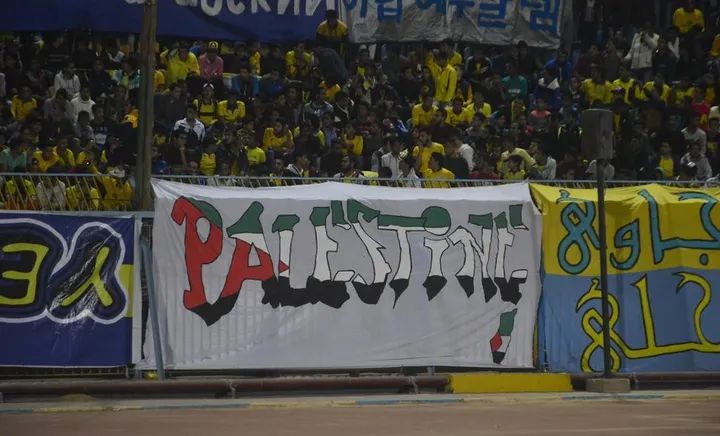
The confrontations moved from the stadiums to the squares, with the January 2011 revolution marking a turning point. Ultras groups played a significant role in the protests that led to the ousting of former President Hosni Mubarak. Drawing on their previous experience and tactics in dealing with clashes with police forces, they were able to defend Tahrir Square, particularly in the infamous “Battle of the Camel”. After that fateful incident, the ultras earned a reputation for being the "protectors of the revolution."
Among the ultras’ martyrs on what was called the “Friday of Wrath” were Ahmed Kamal, member of the Ultras Ahlawy, and Hussein Taha, member of the Ultras White Knights. When the Supreme Council of the Armed Forces assumed power, ultras’ youth were among the protesters who returned to the squares to voice their refusal of military rule. They vigorously participated in the violent confrontations with the Ministry of Interior and the Military Police, offering martyrs in these battles. Among their martyrs were Ultras White Knights member Shihab al-Din Ahmed, who was shot dead in the events of Muhammad Mahmoud Street, and Ultras Ahlawy member Muhammad Mustafa, also known as Karika, who was killed in an altercation with the military police at the Council of Ministers.
“Strike with your tear gas. Strike with bullets and brass. Our generation no longer fears death at your hands”… “In every corner of my land, the martyr's voice is loud and clear. With his life, he writes a song for a new dawn without any fear. No longer shall we live as slaves. In our country, we shall be free.” Those were the words of the anthem chanted by ultras youth as they bravely faced the bullets in the squares.
Solidarity with peoples' causes was part of the ultras’ culture long before the January 2011 uprising. Ultras have always raised the Palestinian flag and advocated for the Palestinian cause with slogans and chants. And on January 22, 2011, Al-Ahly fans chanted Tunisia’s name to celebrate the Tunisian revolution, raising the country’s flag.
The confrontations spilled out from the stadiums to the squares, with the January 2011 revolution marking a turning point. Ultras groups played a significant role in the protests that led to the ousting of former President Hosni Mubarak.
Ultras groups had a profound impact on other protesters who adopted their organizational style and chanted their songs and protest slogans in demonstrations. The young people of the January 2011 revolution also formed political ultras’ movements along the lines of the sports fan associations, such as the Ultras Thoragi (Ultras Revolutionary) during the rule of the Supreme Council of the Armed Forces. With the first post-revolution presidential elections, electoral campaigns created ultras groups named after their respective candidates to promote and support those candidates. Following the overthrow of the Muslim Brotherhood in 2013, the Brotherhood quickly formed new political ultras movements, such as the Ultras Rabaawi, rooted in political Islam to mobilize the Rabaa Square protests. During this period, the activities of the Islamic-affiliated Ahrar Movement emerged. Most of the group’s members and leaders were associated with the Ultras White Knights.
“Their affiliated media called for the audience to return. They gathered the fans; let them enter for free. Finally, we thought we were going back. But it was an ambush, an attack.” This is an excerpt from the song “The Cry of the Twenty”, chanted by the Ultras White Knights following the Air Defense Stadium massacre. In 2015, the Ministry of Interior installed iron wire cages at the entrances to the Air Defense Stadium. These cages turned the gates into harrowing corridors of death, where security forces fired tear gas and gunshots, causing the tightly packed fans of Zamalek to suffocate and die. The police went on to arrest some Ultras White Knights members, and instead of holding the actual perpetrators accountable, the prosecution charged those members with the murder of their fellow fans.
Only three years separate the two bloodiest massacres in Egyptian football history. The Port Said Stadium massacre left 72 dead among the Ultras Ahlawy, while the Air Defense Stadium massacre left 20 dead among the Ultras White Knights. The ultras had long been a nightmare for the regime, and for that, the authorities sought to exterminate their movement. This was a fearless movement that did not hesitate to confront the government and chant against it in the stands. Ultras have chanted “The people want the execution of the Field Marshal,” and tirelessly reminded the regime of the painful past, yelling out: “We will never forget Tahrir Square.”
A supporter, not an “inmate”
“I am a supporter, not an inmate ... I wouldn’t trade my freedom for anything.” The Ultras White Knights composed this song as a plea for the release of their fellow supporters, in which they demanded “Freedom for the stadium, freedom for the fans.” The ultras dedicated this song to every imprisoned supporter inside or outside Egypt and to the souls of their martyrs.
Sayed Moshagheb, a leader of the Ultras White Knights and one of its co-founders, is one of the defendants against whom court rulings have been issued. Since his arrest, Moshagheb, who has received a 7-year prison sentence, has been living in harsh conditions inside his prison cell, prompting him to object by going on hunger strike more than once.
The young people of the January 2011 revolution formed political ultras’ movements along the lines of the sports fan associations, such as the Ultras Revolutionary. With the first post-revolution presidential elections, electoral campaigns created ultras groups named after their candidates to promote them.
In 2017, the parliament passed Sports Law No. 71, which banned the establishment of sports fans' associations. Earlier, courts had classified ultras’ associations as outlawed terrorist groups. After a series of crackdown campaigns, some ultras’ members have announced their group’s dissolution and the suspension of their activities.
Even with an unprecedentedly tightened grip on the Egyptian stadiums, the regime continued launching crackdown campaigns within the stands, relentlessly pursuing and arresting supporters and ultras. During the Al-Ahly and Moroccan Raja match at Cairo Stadium on April 22, 2023, security forces arrested several Al-Ahly supporters because of a chant against the “narcs”, referring to the fake fans who work as police informants. Despite the Public Prosecution’s order of their release, the Supreme State Security Prosecution held them in jail in connection with Case No. 708 of the Supreme State Security on charges of “joining a terrorist group”.
In response to the security crackdown in the stadiums, the ultras led a campaign calling for a boycott of the stadiums and publishing the hashtag #Leave_it_Empty on social media websites. In a statement on its Twitter page (4), the Ultras White Knights expressed solidarity with the Ultras Ahlawy imprisoned members, calling on fans to boycott matches. The statement emphasized: “We declare our full solidarity with Al-Ahly fans and all Egyptian fans who suffer from these practices. We call on all free fans and people of dignity to boycott attending the matches in such an atmosphere which fails to guarantee fans their most basic rights of dignity and freedom within their own country and the stadiums (…), rights which the authorities, regrettably, reserve solely for non-Egyptian fans.”
Eulogies on the walls
Graffiti is one of the artistic forms that the ultras have mastered and used to protest and pay tribute to its martyrs. Murals have appeared, particularly on Mohamed Mahmoud Street, adorned with depictions of the ultras who were martyred during the events of the revolution and the treacherous massacres orchestrated by the authorities.
These murals quickly spread to the rest of the public squares and the governorates. Despite the authorities’ repeated attempts to remove or cover these works, young revolutionaries have persistently re-drawn them, adding defiant phrases that challenge the government, such as “Wipe it again, you cowardly regime.”
In response to the attempts to muffle these voices, Ultras Devils released a song entitled “Graffiti”. The song's lyrics say: “Erase my graffiti / Distort my murals / The Interior dogs have lost their wits / because my murals expose them and their tricks...”
“Glory to the Martyrs” is another song by the Ultras Devils, made in memory of Khaled Omar, the graffiti painter killed in the Port Said massacre: “His name was Khaled, and he was a painter / His graffiti spoke louder than words and wiser.”
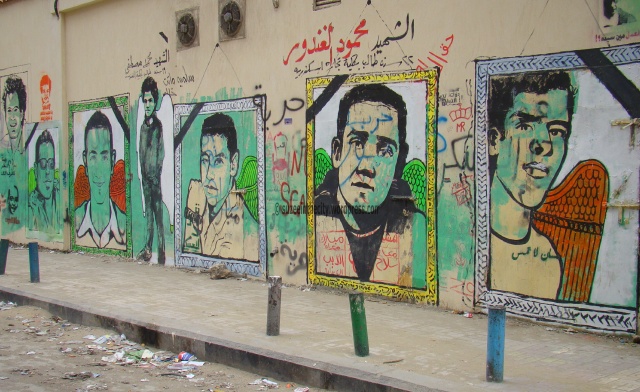
The content of this publication is the sole responsibility of Assafir Al-Arabi and Rosa Luxemburg Foundation cannot accept any liability for it.
Translated from Arabic by Sabry Zaki
Published in Assafir Al-Arabi on 03/06/2023
1 According to "The Ultras" by Muhammad Jamal Bashir (Dar Don for Publishing and Distribution), Cairo, 2011.
2 The trompeta (not to be confused with the trumpet) is a musical instrument used by ultras groups in the stands. It is a large drum which accompanies the chants and songs.
3 Enppi is an Egyptian sports club established in 1985 and owned by the Engineering Company for Petroleum and Petrochemical Industries.
4 Statement by the Ultras White Knights on its Twitter page, April 24, 2023. https://twitter.com/WHITEKNIGHTS07/status/1650504868216336388

